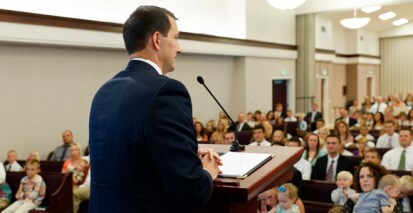“Men” Doesn’t Include Women (Except When It Does)

A few weeks ago, a man gave a talk in a sacrament meeting I was visiting. He spoke on a Come Follow Me lesson that included the book of Numbers. He said that Numbers could be a difficult book to read because of, well, all the numbers. But he said you could find God’s love there, too, and he used the example of when God commanded a census to be taken of all the Israelites and that each individual was counted and named one by one. His point, I think, is that this anecdote was proof that God values and loves us individually.
It was a nice thought, but I immediately flipped to Numbers chapter 1 and saw, with sinking heart, exactly what I expected to see. Only men over the age of 20 were counted in the census. Only men were named one by one. And the census was for a roster of potential soldiers. There is a second census taken in Numbers chapter 26 for the same purpose, as well as for dividing the land for their inheritance. The Levites were excluded from the soldier census due to their ecclesiastical responsibilities, but in the second census, each Levite male of one month of age or more was counted. With perhaps a very few exceptions, girls and women were not counted or named at all.
Not every insight from the scriptures has to be universal, but I am so tired of the lack of women and the lack of acknowledgment that women are missing. And women are missing and underrepresented everywhere: they are missing in our scriptures, in our lesson manuals, in priesthood quorums, in our church leadership on every level. They are missing in our General Conference speaker line ups, in our church councils, in our hymns and children’s songs. Women are missing in the temple ceremony, in our understanding of the afterlife, and in the Godhead.
These are all facts. And yet, we do not acknowledge them. When we pretend this inequity doesn’t exist or we fail to point it out, it sends the message to women and girls that they are inessential, that they are afterthoughts, that their personhood is subsumed under whatever male they happen to be attached to.
The man who gave the talk I referenced may not have noticed that an entire gender, plus children, was excluded in this census when he had his insight. As a man, he is able to take for granted that all words for humankind in the scriptures, except for the very few uses of “women,” include him. Women are so used to identifying with men and male characters and assuming that male-gendered language applies to us (except when it doesn’t) that many of us don’t recognize when we’re excluded, either.
I wonder, though, if he’d have had the same insight if the genders were reversed in these particular chapters. If the scriptures had said, “Take a census of the whole Israelite community by their clans and families, listing every woman by name, one by one” (Numbers 1:2, NIV), if he was not explicitly included in the verse due to his gender, would he still have felt that it was an example of God loving all of us individually?
I have no doubt there are women who have had the same insight that this man did, despite their lack of inclusion in the gendered language. But men are not at all accustomed to inserting themselves into the gendered language of scripture and doctrine as women are. Their inclusion is so taken for granted, I doubt most men (particularly straight, white, cis men) have considered what reading the scriptures is like for people who are only marginally, if at all, included in the text, the speakers, and the stories.
Since basically all of our leaders fall into that category, I am pessimistic that acknowledgment or even awareness of this issue will improve on a church-wide level anytime soon. Until then, women will continue to sit through talks and lessons that assume “men” means “people” (except when it doesn’t).



